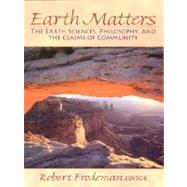
| Preface | vii | ||||
| PART I ROCK LOGIC: THE NATURE OF THE EARTH SCIENCES | 1 | (62) | |||
|
2 | (9) | |||
|
|||||
|
11 | (14) | |||
|
|||||
|
25 | (10) | |||
|
|||||
|
35 | (16) | |||
|
|||||
|
51 | (12) | |||
|
|||||
| PART II THE EARTH SCIENCES IN LIFE OF THE COMMUNITY | 63 | (88) | |||
|
64 | (15) | |||
|
|||||
|
79 | (20) | |||
|
|||||
|
99 | (8) | |||
|
|||||
|
107 | (12) | |||
|
|||||
|
119 | (22) | |||
|
|||||
|
141 | (10) | |||
|
|||||
|
|||||
|
|||||
| PART III PHILOSOPHIC APPROACHES TO THE EARTH | 151 | (54) | |||
|
152 | (13) | |||
|
|||||
|
165 | (10) | |||
|
|||||
|
175 | (14) | |||
|
|||||
|
189 | (16) | |||
|
|||||
| Index | 205 |
The New copy of this book will include any supplemental materials advertised. Please check the title of the book to determine if it should include any access cards, study guides, lab manuals, CDs, etc.
The Used, Rental and eBook copies of this book are not guaranteed to include any supplemental materials. Typically, only the book itself is included. This is true even if the title states it includes any access cards, study guides, lab manuals, CDs, etc.